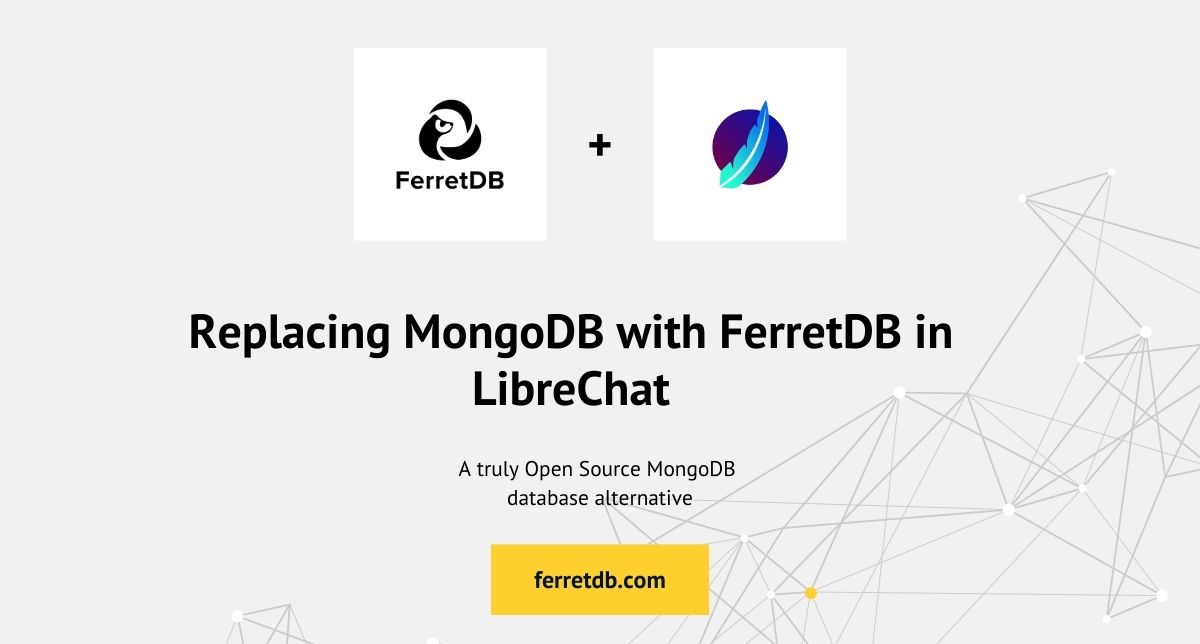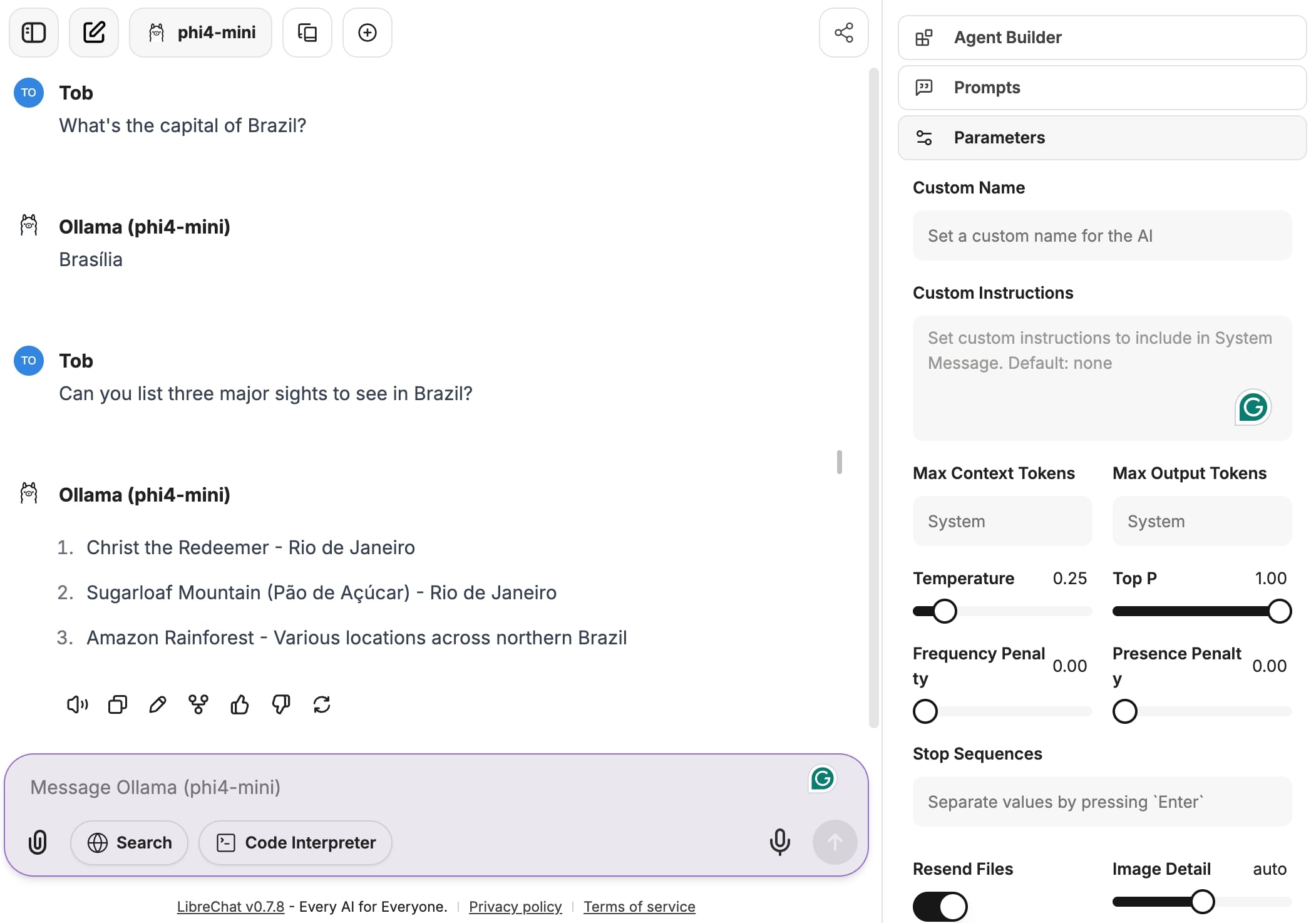Replacing MongoDB with FerretDB in LibreChat

LibreChat is a free, open-source application that provides a user-friendly and customizable interface for interacting with various AI providers and models.
It allows users to connect with cloud providers like OpenAI, Azure, Anthropic, and others as well as fully open-source tools like Ollama, which lets you run models like phi4-mini locally.
For LibreChat users who want to stay fully open source, FerretDB is a great drop-in replacement for MongoDB, especially if you're looking to avoid proprietary databases or vendor lock-in. It uses PostgreSQL with DocumentDB extension as the backend, while letting you use familiar MongoDB operations and commands.
This guide shows how to run LibreChat with FerretDB (instead of MongoDB) and Ollama to run the phi4-mini model locally – with all components being fully open source.
Prerequisites
To follow this guide, ensure:
-
Docker is installed and running on your machine.
-
Ollama is installed and running on your machine. If you haven't installed Ollama yet, download it from the official website. This guide uses the
phi4-minimodel, an open-source model optimized for reasoning and accuracy in text-based tasks. Once Ollama is running, pull thephi4-minimodel:ollama pull phi4-mini
How to set up LibreChat with FerretDB
Start by cloning the LibreChat repository:
git clone https://github.com/danny-avila/LibreChat.git
cd LibreChat
You can find more instructions on how to set up LibreChat in the LibreChat documentation.
Next, copy the .env.example file to .env:
cp .env.example .env
You may need to adjust the environment variables in .env to suit your setup.
For instance, you may have to set the UID and GID or it will default to a blank string.
You can run FerretDB alongside LibreChat using Docker Compose.
To do that, we'll add the FerretDB evaluation image to your docker-compose.override.yml file, as shown below:
services:
api:
environment:
- MONGO_URI=mongodb://<username>:<password>@ferretdb:27017/LibreChat
depends_on:
- ferretdb
ferretdb:
image: ghcr.io/ferretdb/ferretdb-eval:2
restart: on-failure
ports:
- 27017:27017
environment:
- POSTGRES_USER=<username>
- POSTGRES_PASSWORD=<password>
- POSTGRES_DB=postgres
mongodb:
profiles:
- donotstart
Replace <username> and <password> with your desired FerretDB credentials.
In the above docker-compose.override.yml file, we use the FerretDB evaluation image (ferretdb-eval:2), which is suitable for development and testing purposes.
It includes PostgreSQL with DocumentDB extension, which FerretDB uses as its backend.
We also place the mongodb service under the donotstart profile so it won't start by default.
This means you need to explicitly update the LibreChat api service to not depend on the mongodb service in your docker-compose.yml file – or you can remove the mongodb service entirely from the docker-compose.yml file.
If you're new to FerretDB, you can learn more about the FerretDB installation guide here.
Using Ollama with LibreChat
LibreChat supports Ollama, allowing you to run open-source models like phi4-mini locally.
We assume you have Ollama installed and the phi4-mini model pulled.
You can use any other Ollama model as well, just replace phi4-mini with the desired model name.
You can also check the LibreChat documentation for more details on setting up Ollama locally.
Start by copying the example configuration file for LibreChat:
cp librechat.example.yaml librechat.yaml
Then add the following under the custom section in librechat.yaml:
custom:
- name: 'Ollama'
apiKey: 'ollama'
baseURL: 'http://host.docker.internal:11434/v1/'
models:
default: ['phi4-mini']
fetch: false
titleConvo: true
titleModel: 'current_model'
summarize: false
summaryModel: 'current_model'
forcePrompt: false
modelDisplayLabel: 'Ollama (phi4-mini)'
Mount the configuration file in docker-compose.override.yml:
api:
volumes:
- type: bind
source: ./librechat.yaml
target: /app/librechat.yaml
Then restart your containers to apply the changes:
docker compose down
docker compose up -d
This will start FerretDB and PostgreSQL with DocumentDB extension, and LibreChat will connect to FerretDB using the specified connection string.
You will also have Ollama running with the phi4-mini model available.
This setup allows you to run LibreChat in a fully open-source environment without vendor lock-in or license restrictions.
Interacting with your AI models via LibreChat
After starting the services, you can access LibreChat by navigating to http://localhost:3080 in your web browser.
This will open up the LibreChat interface, where you can sign up and proceed to interact with the phi4-mini model running locally via Ollama.
The image below shows an interaction with the open-source phi4-mini model running locally via Ollama in LibreChat:

Once you interact with LibreChat, it creates a database named LibreChat in FerretDB and stores all user conversations and settings there.
You can verify this by listing the collections:
LibreChat> show collections
actions
agents
assistants
balances
banners
conversations
conversationtags
files
keys
messages
pluginauths
presets
projects
promptgroups
prompts
roles
sessions
sharedlinks
tokens
toolcalls
transactions
users
LibreChat>
You can view the conversation data in messages collection:
LibreChat> db.messages.find().sort({ createdAt: -1 }).limit(2).pretty()
[
{
_id: ObjectId('68418b91651dcd2f71046760'),
messageId: '2496e0e0-78dd-4618-bf03-b23fc413554b',
user: '68418a0040fa9c1513e29565',
updatedAt: ISODate('2025-06-05T12:20:33.528Z'),
expiredAt: ISODate('2025-07-05T12:20:33.527Z'),
unfinished: false,
tokenCount: 46,
text: '1. Christ the Redeemer - Rio de Janeiro\n' +
'2. Sugarloaf Mountain (Pão de Açúcar) - Rio de Janeiro\n' +
'3. Amazon Rainforest - Various locations across northern Brazil',
finish_reason: 'stop',
endpoint: 'ollama',
sender: 'Ollama (phi4-mini)',
model: 'phi4-mini',
isCreatedByUser: false,
parentMessageId: 'b8c08f11-913e-4528-b1ee-776a8d5c9ed1',
conversationId: '510281d1-7cc1-4b01-b14b-f3add7302ca7',
__v: 0,
createdAt: ISODate('2025-06-05T12:20:33.528Z'),
error: false,
_meiliIndex: true
},
{
_id: ObjectId('68418b8f7df82acbc800dbe0'),
messageId: 'b8c08f11-913e-4528-b1ee-776a8d5c9ed1',
user: '68418a0040fa9c1513e29565',
updatedAt: ISODate('2025-06-05T12:20:33.549Z'),
expiredAt: ISODate('2025-07-05T12:20:33.548Z'),
unfinished: false,
endpoint: 'ollama',
tokenCount: 15,
isCreatedByUser: true,
text: 'Can you list three major sights to see in Brazil?',
sender: 'User',
conversationId: '510281d1-7cc1-4b01-b14b-f3add7302ca7',
parentMessageId: '48986d58-e1e7-478f-a98b-92049bdefb67',
__v: 0,
createdAt: ISODate('2025-06-05T12:20:31.447Z'),
model: null,
error: false,
_meiliIndex: true
}
]
With this, we can confirm LibreChat has persisted the conversation history in FerretDB's messages collection.
You'll see both the user's question and the assistant's responses, along with metadata like model, sender, timestamps, and token counts.
That's it! You've successfully replaced MongoDB with FerretDB in LibreChat.
Further resources
By swapping MongoDB for FerretDB, you can run LibreChat in a completely open-source setup, without vendor lock-in or the license restrictions that come with SSPL.
Besides, you can also run open-source models like phi4-mini locally using Ollama, ensuring your entire stack remains open source.
To learn more about FerretDB, check out the following resources:
Need help? Feel free to reach out to us on any of our community channels.
